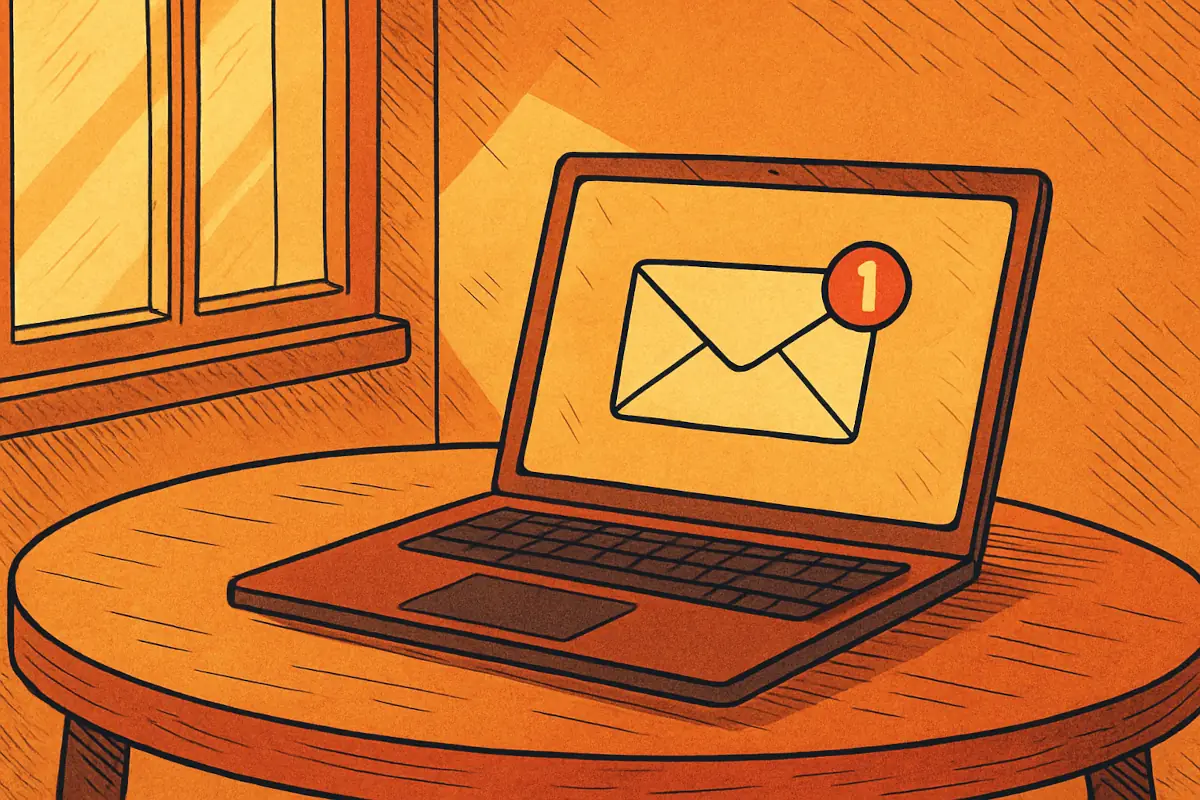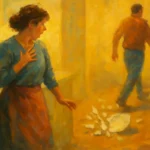The Link Between Unhealed Past Hurt and Chronic Indecision
With Insights from Dr. Bessel van der Kolk, Author of The Body Keeps the Score
When Every Choice Feels Heavy
He sat at the kitchen table long after the coffee had gone cold, staring at an unopened email that could have changed his week, maybe even his year. The envelope icon sat there, small and unassuming, yet heavy enough to keep his fingers still. A decision. A simple yes or no. That was all it was asking of him.
And yet—
His shoulders had already drawn upward, inch by inch, until they nearly met his ears. His jaw felt locked, a clenched hinge holding back words he hadn’t yet spoken. Somewhere beneath his ribs, his heartbeat was an irregular drum, sometimes rapid, sometimes stuttering, as if unsure whether to run or stay frozen.
The voice of the Critic stood at his left shoulder. “You can’t afford another mistake.”
The Passive Self hovered on his right. “Better to wait. Waiting is safe. You don’t have to watch things fall apart if you never start them.”
He pressed his thumb against the trackpad, then pulled it back, a reflex as automatic as flinching from heat. The cursor blinked patiently in the reply box, its rhythm matching the tight pulse in his temple.
It wasn’t the first time. He had done this dance with indecision before—at job offers, at invitations, at moments when a bolder man might have leapt without looking. For him, even the smallest leap felt like a cliff edge.
Last week, he’d stood in the grocery aisle for twenty minutes, paralyzed between two brands of pasta sauce. The choice was meaningless, but the tension in his chest was real. It wasn’t about tomatoes or herbs—it was about the echo.
The echo came from years ago.
A slammed door after he’d spoken his mind.
A grade on a paper that proved, according to the teacher, that he “wasn’t thinking.”
A silence from someone he’d loved after he’d chosen wrong.
The past had left fingerprints on his present, invisible but permanent.
Dr. Bessel van der Kolk once wrote that “the body keeps the score.” If that was true, his body’s scoreboard was littered with near-misses and forfeits.
Every decision felt weighted, as though hidden beneath it was a trapdoor that might give way. His body remembered more than his mind wanted to admit. His pulse didn’t quicken over pasta sauce because of the sauce—it quickened because somewhere, in the unwritten code of his nervous system, choice had been tied to loss.
That morning, he didn’t answer the email. He closed the laptop instead. The coffee had grown bitter. And a thin, invisible frost crept back over the river inside him, sealing it in stillness once more.
How Old Wounds Show Up in the Present
By mid-afternoon, the unopened email had been joined by two unanswered texts, a voicemail, and an unstarted grocery list. Each one was small, manageable, harmless — at least to anyone else. To him, they stacked like bricks, heavier with every hour, until his mind felt walled in.
He carried the weight differently than most. It showed not in frantic motion but in the absence of motion, in the way his hand would hover above a phone before setting it back down, in how his feet would root to the spot while the world moved on around him.
It had started young.
At eight years old, he had stood in the school cafeteria line, tray trembling in his hands, asked to choose between two lunch options. He had picked the wrong one — wrong only because a classmate had laughed, pointing to his plate, making a show of his choice to everyone within earshot. The sound of that laughter stuck to him like damp wool.
By twelve, he’d learned that certain answers at home invited arguments sharp enough to draw invisible blood. Safer, then, to say nothing at all.
By seventeen, a girl he thought he might love had asked him what he wanted their future to look like. He had hesitated, words pooling in his throat but never spilling out. She hadn’t waited for him to find them.
It wasn’t just bad luck. It was training.
The nervous system learns, van der Kolk writes, and when it learns that choices lead to pain, it doesn’t forget. The body records each decision gone wrong as a mark against safety. The score builds silently, and eventually, the safest route — the one the body believes will keep you alive — is stillness.
This wasn’t cowardice. It was protection. And it worked, at least in the blunt way that a locked door works. Nothing bad got in. But nothing good, either.
In adulthood, this training showed itself in every corner of his life. Job applications sat half-finished on his desktop. Messages from friends went unanswered long enough to fade into silence. He told himself he was waiting for the right moment, for clarity — but in truth, clarity never came.
He lived in the tension between two voices:
The Critic — “You’ll ruin this like you ruined the last thing.”
The Passive Self — “Better to stay still. No one can fault you for a choice you didn’t make.”
Both were wrong, and both were trying to save him.
On the rare occasion he pushed through and made a decision, his body still rebelled. His shoulders would knot until they ached. His stomach would twist, appetite vanishing. He’d spend hours revisiting the choice, interrogating it from every angle, as if preparing evidence for an unseen trial.
Even rest was no refuge. At night, dreams replayed older crossroads — moments he hadn’t chosen, or had chosen poorly — with the sharp clarity of daylight. He woke as tired as he had fallen asleep.
Van der Kolk’s words had come to him through a library book he almost didn’t borrow. The Body Keeps the Score. The title alone had stopped him, something about its quiet finality.
As he read, he began to see his indecision not as a personal failing but as a bodily habit — the nervous system’s way of bracing against a past that never fully ended. Trauma, van der Kolk explained, fragments a person’s sense of self, leaving them unsure if they can trust their own instincts.
It was as though someone had drawn a map of him without ever meeting him, marking the frozen rivers and foggy crossroads exactly where they lay.
But knowing wasn’t the same as moving. The knowledge sat inside him like a warm coal — enough to glow, not enough to thaw.
A Decision That Wouldn’t Let Go
The letter arrived on a Tuesday, in an envelope too formal to be anything but important. Inside was an offer — a new position at a company across the city. Better pay, steadier hours, work that might even matter to him. The sort of opportunity he’d quietly told himself he’d take if it ever came.
Now it had. And he could not move.
Every time he thought about accepting, his chest tightened as though he were about to step into traffic. Every time he imagined declining, a dull ache bloomed low in his stomach, the ache of a door closing forever.
That night, he lay in bed, staring at the ceiling fan as it traced slow circles in the dark. His mind played both endings — the leap and the retreat — until they blurred together into the same restless loop.
He remembered van der Kolk’s words: hesitation was not failure, it was protection. If that was true, then maybe there was a way to thank his body for trying to keep him safe, even while teaching it that safety could exist in motion.
Beginning to Unfreeze
See Indecision as Protection, Not Failure
Sitting at the kitchen table the next morning, he placed his palm flat on the wood, grounding himself in the feel of something solid. He could admit that the pause had been his shield for years.
EFT tapping:
Setup: Even though I’m scared to stop seeing my hesitation as a flaw — scared it might mean I won’t be safe — I deeply and completely accept myself and thank my body for protecting me.
Eyebrow: This pause has kept me safe.
Side of eye: My body learned to protect me this way.
Under eye: I don’t have to hate this part of me.
Under nose: It’s done its best for years.
Chin: I can thank it without staying stuck.
Collarbone: I can hold safety and movement together.
Under arm: I’m open to a new way of feeling safe.
Top of head: I’m open to moving with trust.
Reconnect With the Body
In the quiet of his living room, he lay flat on the floor, letting the carpet press into his back. Breath in, slow enough to expand his ribs. Breath out, loosening the jaw. The thoughts came — then softened.
EFT tapping:
Setup: Even though I’m afraid to feel what my body’s been holding, I honor this fear and choose to meet myself gently.
Eyebrow: My body holds stories I haven’t heard.
Side of eye: I’m not sure I want to hear them.
Under eye: But maybe they’re ready to be told.
Under nose: I can listen without judgment.
Chin: I can meet my body as an ally.
Collarbone: Breathing is a first step.
Under arm: I can be with myself in this moment.
Top of head: I choose gentleness as I reconnect.
Name and Soften the Inner Critic
That afternoon, he wrote the Critic’s lines as they came: You’ll mess this up. You’re not qualified. They’ll regret hiring you. On paper, they lost their size.
EFT tapping:
Setup: Even though I believe I need this critic to stay sharp, I’m open to the idea that I can strive without fear.
Eyebrow: This critic thinks it’s helping me.
Side of eye: It’s trying to keep me from failing.
Under eye: But its voice wears me down.
Under nose: I can choose a kinder guide.
Chin: I can be my own encourager.
Collarbone: I don’t have to be perfect to be safe.
Under arm: I can soften without losing my edge.
Top of head: I’m open to trusting myself.
Practice Small, Low-Stakes Decisions
The next day, he stood in the park, choosing between two winding paths. He picked one without overthinking, the crunch of gravel underfoot like a quiet applause.
EFT tapping:
Setup: Even though it feels silly to practice on small choices, I’m open to letting them count as victories.
Eyebrow: Every choice is a chance to build trust.
Side of eye: Even the smallest ones matter.
Under eye: My nervous system needs these wins.
Under nose: I can celebrate each one.
Chin: I can let this confidence grow.
Collarbone: Safety can come in small steps.
Under arm: I choose to notice my progress.
Top of head: I’m building a new way forward.
Allow Space for Grief
One evening, he lit a candle and sat with old photographs he usually kept hidden. Faces he had lost. Chances he had never taken. The grief rose like a tide — and he didn’t push it back.
EFT tapping:
Setup: Even though I’m afraid this grief will overwhelm me, I honor it as part of my story and allow it to move through me.
Eyebrow: This grief is heavy.
Side of eye: It’s been waiting for me to notice.
Under eye: I don’t have to face it all at once.
Under nose: I can let it come in waves.
Chin: I can survive each wave.
Collarbone: This sadness means I cared.
Under arm: I can honor what was lost.
Top of head: I can make space for healing.
A Quiet Redemption
The morning the frost began to break, nothing in the weather had changed. Yet something in the air felt different — as if the house itself had taken a deeper breath.
He sat once more at the kitchen table, the job offer open before him. His shoulders rested lower. His jaw was softer. His breath moved steady into his belly.
The Critic still spoke. The Passive Self still lingered. But neither held the reins.
He placed his hand on the mouse and clicked “accept.” The sound was small, but it seemed to echo in places the frost had covered for years.
Later, he walked through the park, choosing a path without thinking twice. At a bend, he stopped to watch the river. The surface was still partially iced over, but along the edges, water moved freely, swirling around the remaining slabs of ice.
Every small decision made from self-trust was a quiet reclaiming of his life. And with each step forward, the river inside him learned how to flow again.



